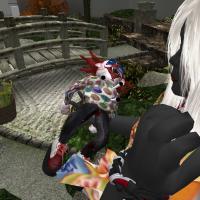Voodoo is basically African Shamanism. There was a first great spirit, the source of all life and creation, but he created the world not as separate from himself but as an act of self expression. Dancing. As he revealed more of his inherent power, or ‘ashe’ as it’s known, he took the form of various spirits known as Loa. Loa were spirits of the elements and of various forces of life, like death or birth.
Ma’at, which was the organized religion of Egypt, stemmed from the more primal voodoo, but they shared much in common as they did with many middle eastern faiths like the Yezidi Kurds. The basic concept was by one name or another, and the various tribes had parallel ideas. They just used different words. Ma’at was a bit more scholarly then voodoo.
What separates voodoo from an understandable religion? Is voodoo a quest for power or a search for understanding? Not really, but voodoo has interesting concepts of power. Voodoo is a keeping of the peace. They believed much as the Egyptians did, that the world would only prosper with peace between the powers in it.
Is it appeasing the spirits? Well, yes and no, and again to reference Egyptian religion they saw things differently. The concept of worship as most westerners think of it, they didn’t do. They would control as much as work with or for the Loa. It was like treating the spirits as a part of the community. They dwelt with them like the American indigenous peoples. They too believed the spirits walked among them, thus I characterized voodoo as African Shamanism.
The concept of ashe governed much of what they did, and even how they governed their own tribes. Simply put, it was the idea that power was the reward of virtue. If you had the power to do something it’s because it stemmed from an inherent virtue in you and it was your right to exercise it. It was like a gift from their higher power. One couldn’t even be chief without being in touch with the Loa, the nature spirits were vital. So they didn’t characterize things as good and evil like we do.
Much like the Native American people there were two general types of shaman. The civic shamans were those who served the tribe. The Houngan or Mambo, the wise folk of their tribes who focused on keeping the peace and seeing to the prosperity of their people. They didn’t worship the Loa, but they did serve them. One grew in power by becoming more attuned to the spiritual force they symbolized as an invisible fire. The Bokor or Sorcerers were said to serve the Lao with both hands, meaning they lived more with the spirits than the people.
This phenomenon shows up in other cultures also, the Chinese Wu-Jen, the Spanish Bujahs and Brujos, even in northern American tribes. They noted those with the gift of shamanism, but who were more “Fey”. More a witch to use the Celtic term. The Brujos were sorcerers. They sought power and were thought to be crazy. They were very moved by the power, elemental in their behaviour like the Toltec seers. But in the indigenous cultures, they aren’t automatically dismissed as evil. The power they sought was mastery of awareness to make better choices, and you can make better choices in a very large context so that the consequences look like magic. A sort of butterfly effect. The pebble that starts the avalanche that no one was expecting. Myself, I’m not a “charismatic” type. I understand what the Hindus call the Bhakti or devotional path, the path with feeling, but it is not how I personally work. For me ashe, or mana if you prefer, luck to use the original Norse meaning of the word, is what moves or governs me. The weird is a related concept to luck in Norse belief.
Your thoughts are welcome. Be well friends.
Travis Saunders
Dragon Intuitive
~science,mysticism,spirituality~


